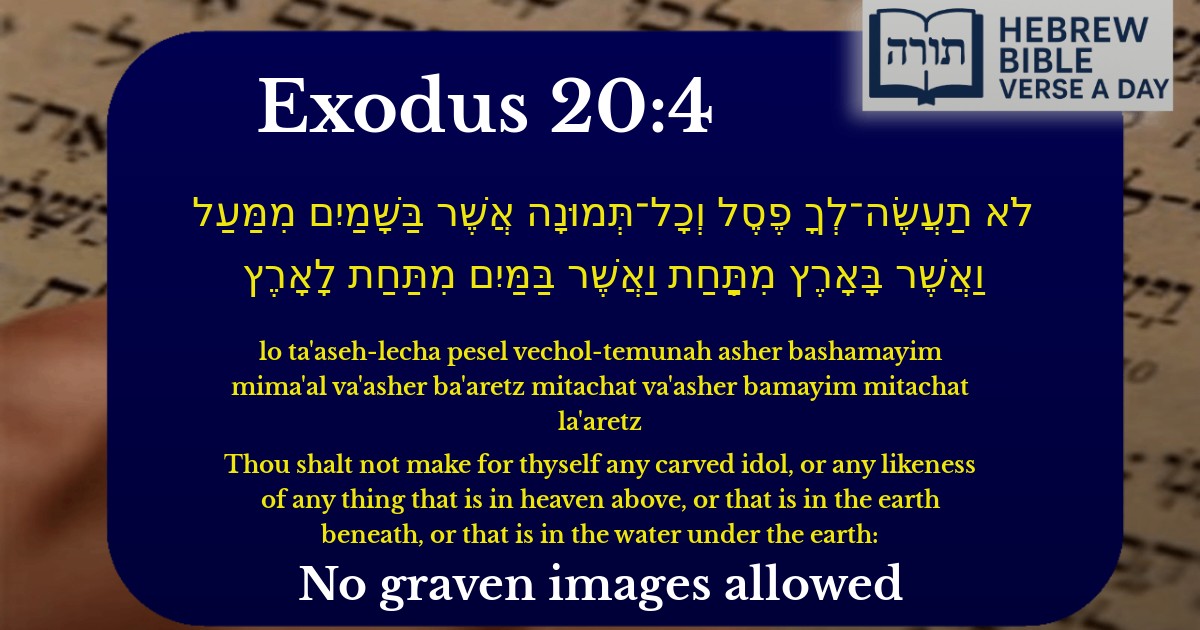Frequently Asked Questions
Q: What does the verse 'Thou shalt not make for thyself any carved idol' mean?
A: This verse, from the Ten Commandments (Exodus 20:4), prohibits creating or worshipping physical representations of G-d or false deities. According to Rashi and Rambam, this includes any images meant to represent the divine, whether of celestial beings (like angels or stars), earthly creatures, or sea life. The Torah emphasizes that G-d is beyond physical form and cannot be confined to any image.
Q: Why is this commandment important in Judaism?
A: This commandment is foundational because it reinforces monotheism—the belief in one, invisible G-d. The Talmud (Avodah Zarah 43b) explains that idolatry distorts our relationship with G-d by reducing His infinite nature to limited physical forms. Rambam (Hilchot Avodat Kochavim) teaches that rejecting idolatry is essential to preserving pure faith and avoiding spiritual corruption.
Q: Does this verse forbid all art or sculptures?
A: No, the prohibition applies specifically to creating images for worship or that could lead to idolatry. The Mishnah (Avodah Zarah 3:1) and Rashi clarify that decorative art—like sculptures or paintings not intended for veneration—is permitted. However, making human or animal figures in contexts that might encourage improper reverence (e.g., full-body statues) is often avoided as a precaution (Shulchan Aruch, Yoreh De'ah 141).
Q: How does this verse apply today?
A: While literal idol worship is rare today, the principle reminds us to avoid 'modern idolatry'—placing excessive importance on materialism, fame, or other distractions that replace devotion to G-d. The Midrash (Sifrei Devarim 54) teaches that anything we prioritize above G-d can become an 'idol' in our lives. This commandment calls us to focus on serving G-d with sincerity and humility.
Q: What can we learn from this commandment?
A: We learn that G-d desires a direct, spiritual relationship with us—not one mediated through physical objects. The Sefer HaChinuch (Mitzvah 26) explains that this mitzvah trains us to recognize G-d's omnipresence and transcendence. By rejecting idols, we affirm that true connection to the Divine comes through Torah study, prayer, and ethical actions—not through symbols or intermediaries.


Prohibition Against Idolatry
The verse (Shemot 20:4) is the second of the Ten Commandments and establishes a strict prohibition against creating or worshipping idols. This commandment is foundational to Jewish belief, emphasizing the absolute unity and incorporeality of Hashem.
Rashi's Explanation
Rashi comments that this prohibition includes not only idols worshipped by others but even images intended for decorative purposes if they resemble entities in the heavens (like the sun, moon, or stars), on earth (animals or people), or in the waters (fish or sea creatures). The Torah forbids creating such images due to the risk of them becoming objects of worship.
Rambam's Perspective
In Hilchot Avodah Zarah (3:10), the Rambam explains that this prohibition extends to any form of representation that could lead to avodah zarah (idolatry), even if one does not intend to worship it. The Rambam emphasizes that this mitzvah safeguards the purity of monotheistic belief by removing any physical representation of the divine.
Talmudic and Midrashic Insights
Halachic Applications
Poskim (halachic decisors) rule that this prohibition applies even if one does not worship the image, as the act of creation could lead others to mistake it for an idol. However, exceptions exist for educational or scientific purposes, provided there is no risk of avodah zarah (Shulchan Aruch, Yoreh De'ah 141).